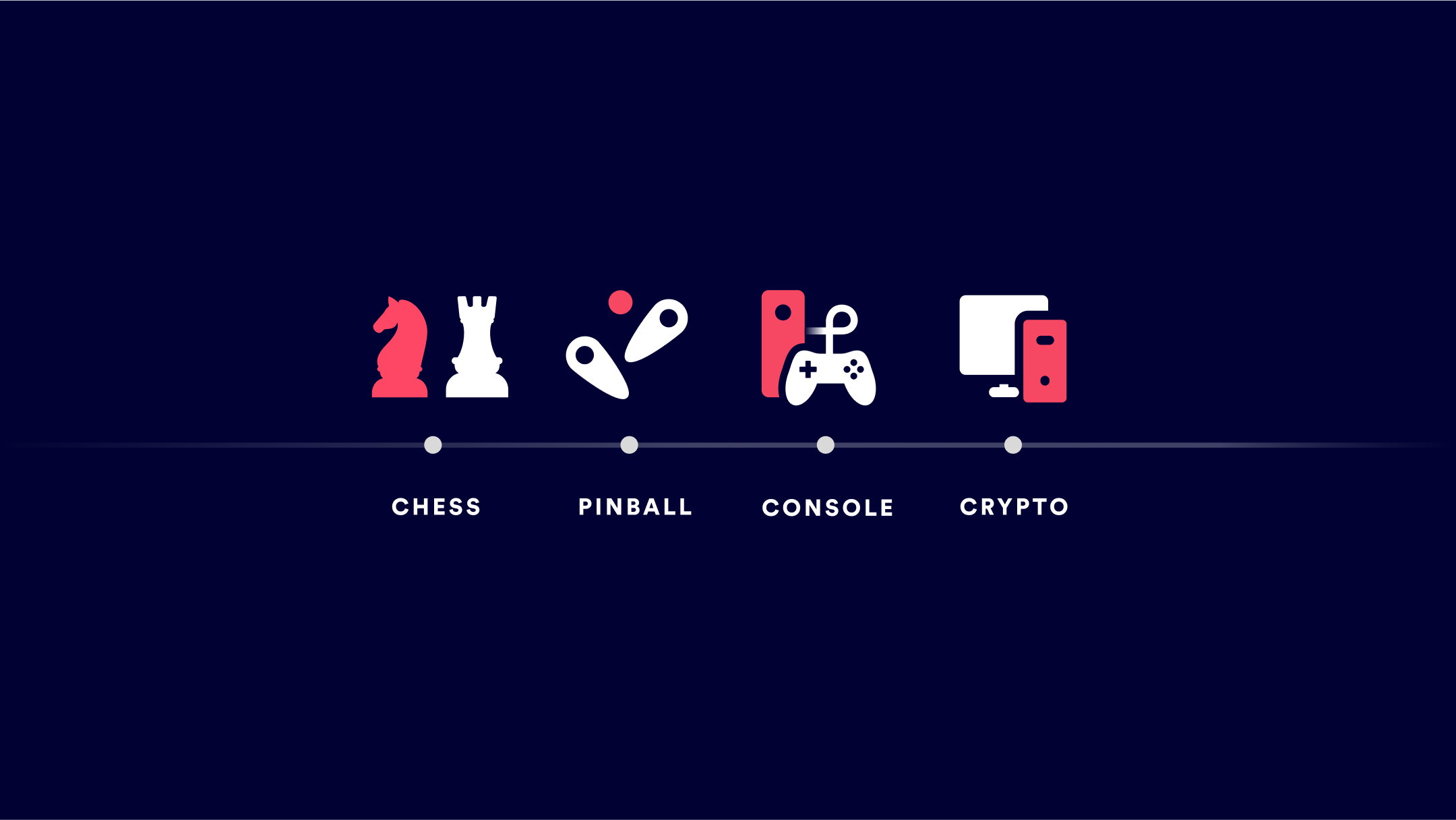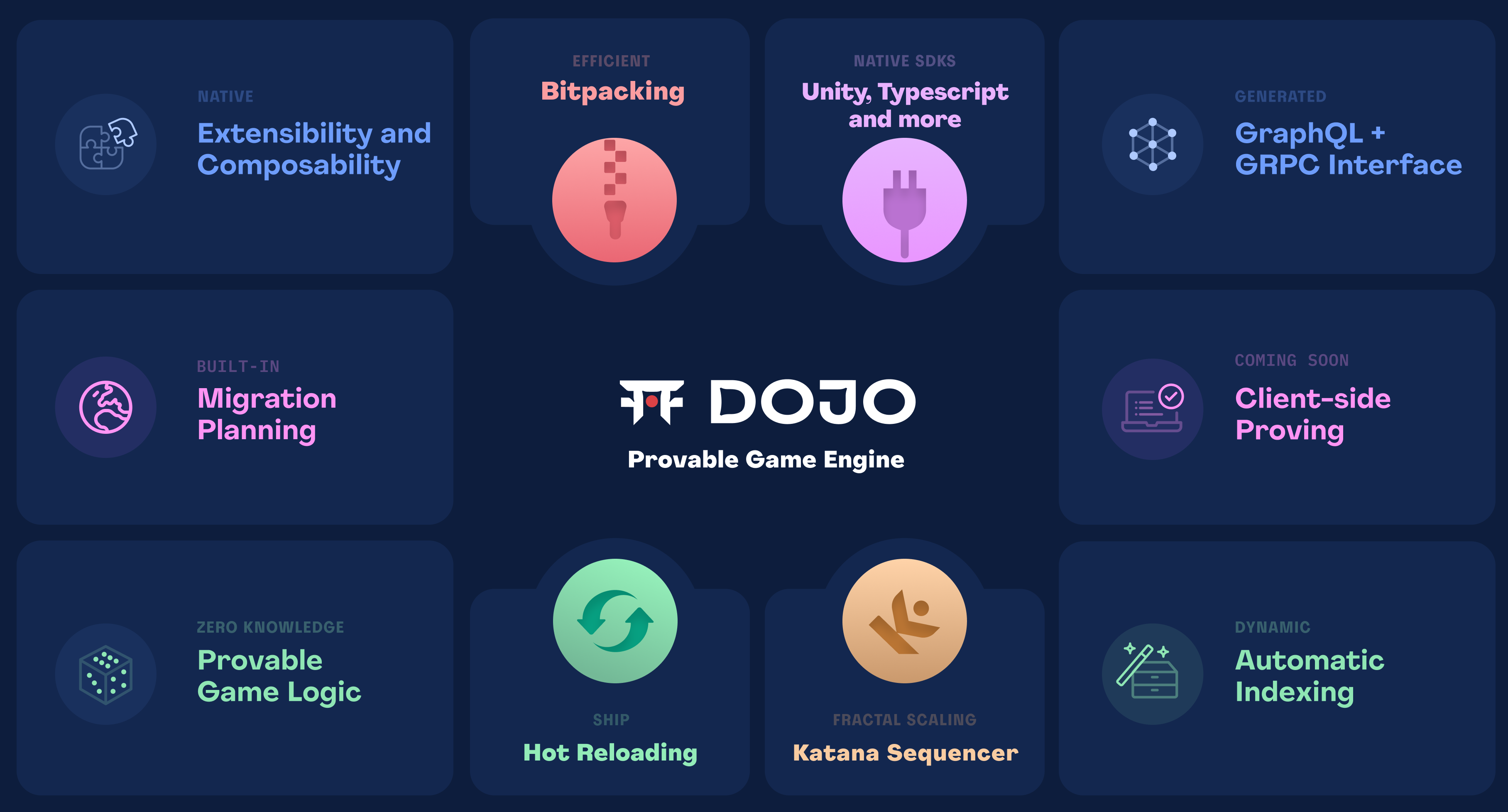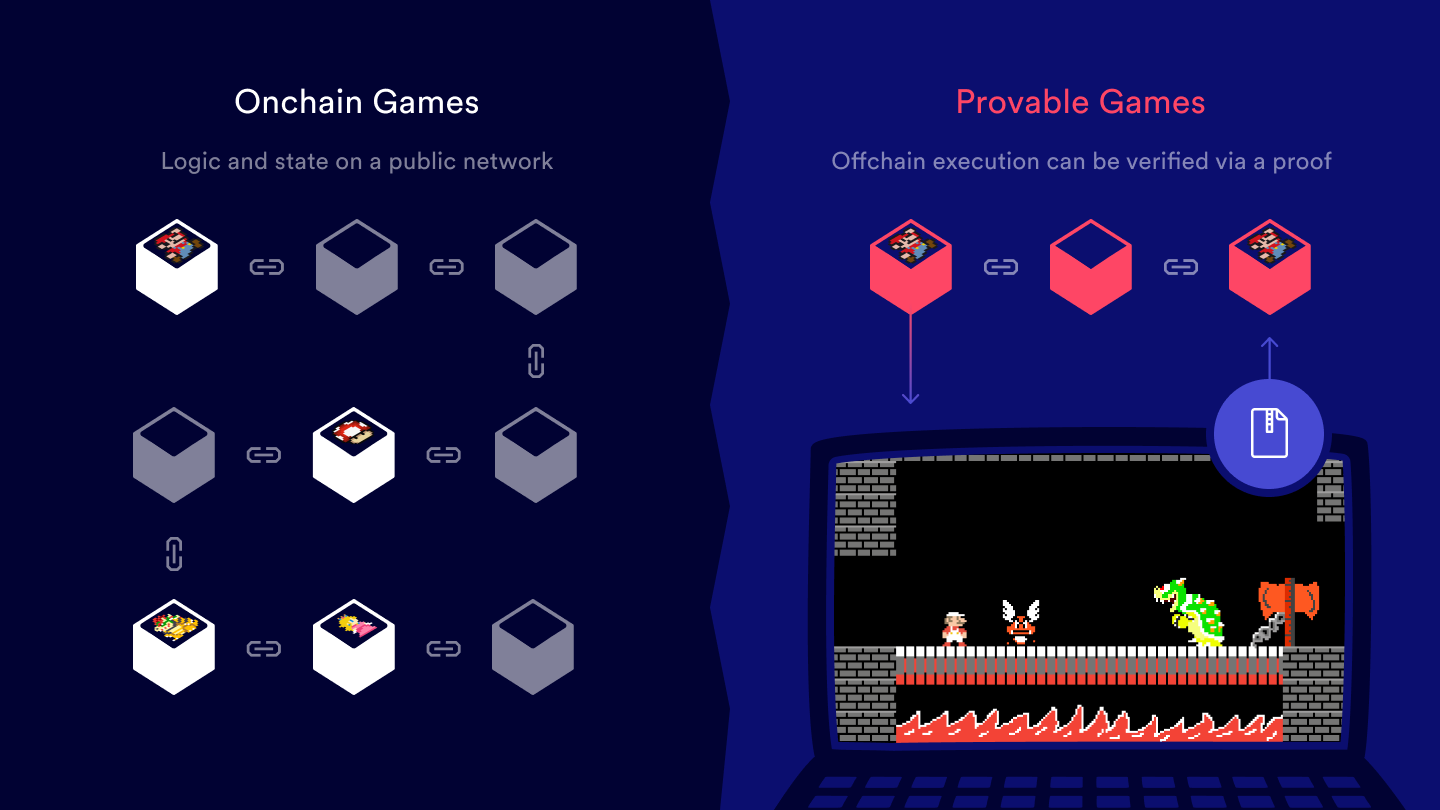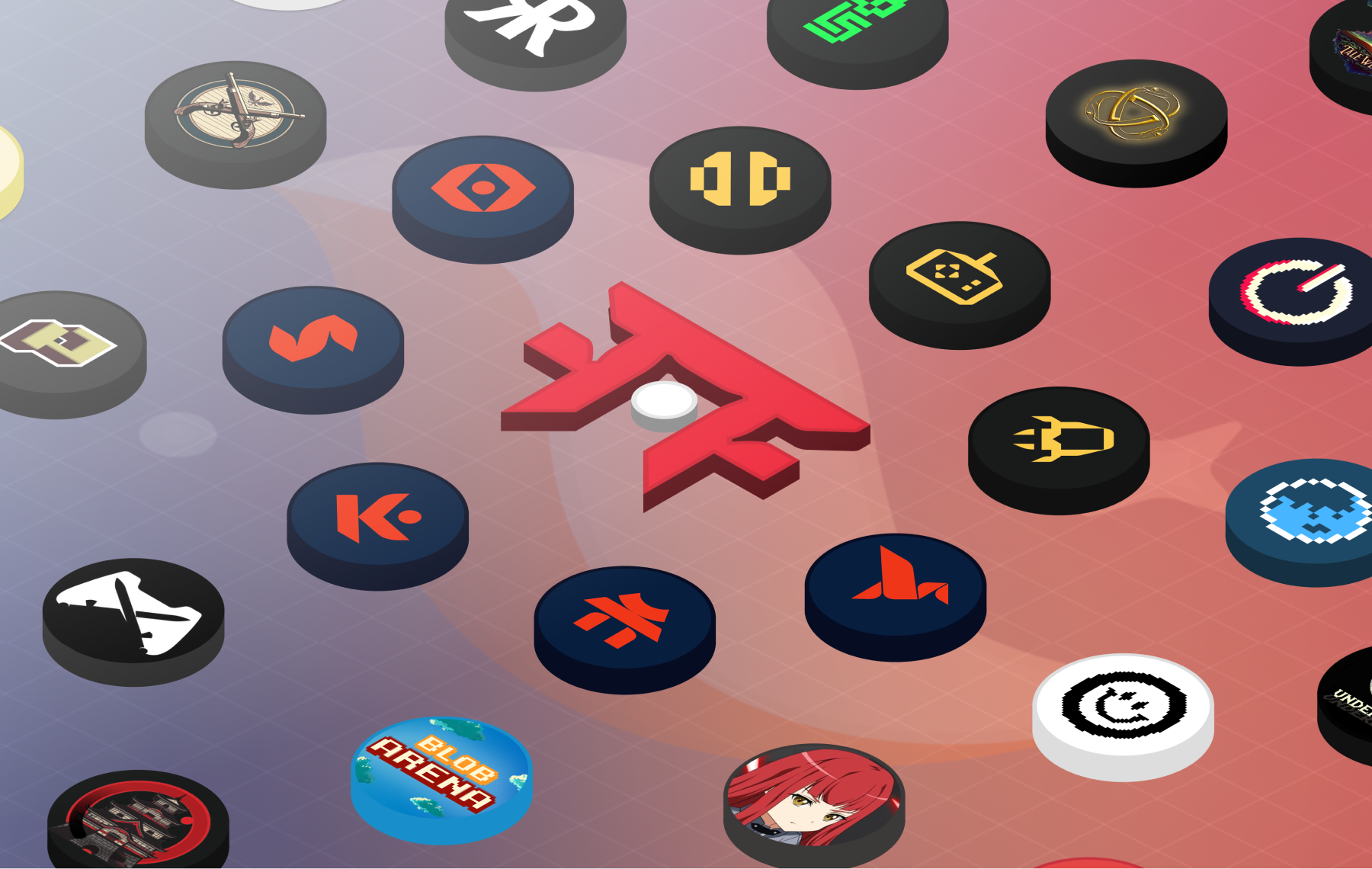
Dojo: The Provable Game Engine
Introduction
In every era, breakout innovations redefine the boundaries of our culture.
The printing press democratized education, the Internet democratized information, and now, verifiable computation is rapidly transforming how we interact and build trust. These gigantic technological leaps do more than just redefine our tools; they fundamentally transform our culture, altering how we interact, learn, play, and govern ourselves in profound ways.
Games have always been integral to human culture, evolving apace with society’s technological advancements. Yet our intrinsic desire for play remains unchanged; an evolutionary trait embedded in our DNA. From arcades to consoles to mobile phones, the essence of gaming stays the same. It is the modes of play that transform.

Today, a new mode of play is emerging, offering a novel approach to interactive entertainment: onchain gaming. In onchain games, both state and logic reside entirely on a public blockchain, defined by smart contracts. This architecture introduces unique value capture mechanisms that can be shared between players and developers, completely redistributing the traditional balance of power in the games industry. By decentralizing control, onchain gaming democratizes play and enables new interactive entertainment experiences not previously possible.
Onchain gaming represents far more than a redistribution of influence, though. In addition to this novel framing, the standardization of logic on a shared network also enables deep levels of composability. In much the same way that reconfigurable “Money Legos” distinguish DeFi from traditional finance, onchain virtual worlds empower participants to share, remix, and reimagine game logic and assets with ease to construct entirely new creations.
The theoretical and technical foundations for an entirely new paradigm of game development are already in place and an eager new wave of game developers stands ready to build upon these foundations.
Dojo brings it all together.
Building Dojo v1
From its humble beginnings in the group chat, Dojo has come a long way. What started as three Sensei (Tarrence, Loaf, and Sylve) has now swelled into a movement.

Fast-forward 20 months:
7+ versions later...
1,000+ PRs later…
5+ game jams later…
50+ test games later…
50+ contributors later…and countless sensei anointed
Dojo v1 arrives
Onchain development is inherently complex, requiring mastery of the entire stack. Developers should focus on perfecting their unique applications rather than grappling with underlying system intricacies.
Dojo abstracts away the complexities of onchain game development, enabling the creation of sophisticated applications with ease. No need to write high-performance indexers — your creativity and code are the only tools required.
Our experience building across the entire tech stack and developing onchain games from scratch inspired the creation of Dojo. With the release of version 1, developers now have access to a comprehensive toolchain, enabling the creation of next-generation scalable onchain applications.

However, we aren’t stopping there.
Dojo extends even farther beyond public networks, expanding the concept of onchain games to include its logical next step forward: provable games.
Provable Games: Moving beyond onchain games
“Have you heard of zero knowledge proofs, sir?”
Eli Ben-Sasson - CEO & Co-founder, StarkWare
The same distributed consensus mechanisms that enable the unique benefits of onchain games mentioned above (value capture, composability, and so on) are also what make scaling these games fundamentally challenging.
Onchain games’ state and logic must exist on a public network and all state transitions must be verified by node providers. This is the key assumption underlying onchain gaming: that we must rely on the network of nodes to provide truth to our games. Unfortunately, this has the added effect of limiting network scalability, constraining the design space available to onchain game developers.
However, there is an alternative path: provable games.

Provable games offer a new way to define digital worlds without the hindrances of network computational limits. These games use zero-knowledge proofs to verify computations, rather than relying on distributed node computation.
What this means practically is that game designers are free to create from a position of abundance. Rather than constraining experiences to fit beneath a limited transaction cap, developers are granted greater freedom to explore genres, designs, and mechanics that unleash players creativity — all without losing the inherent trust assumptions promised by decentralization.
Perhaps more importantly, however, is that this provability represents a fundamental reframing and evolution of the role of trust in decentralized applications. No longer are participants forced to rely upon gigantic networks; they need only place their “trust” in math.
Dojo represents the “0 to 1” moment for these new types of provable applications. It’s never been easier to create provable games – but don’t just take our word for it. Let’s explore some of the provable games already taking shape in the Dojo ecosystem.
The Dojo ecosystem
Since the early days of Dojo, ecosystem builders have been conducting experiments and collaboratively shaping the direction and development of the toolchain. These teams are actively leaning into the ideas of composability and provability, with several games launching to mainnet in the coming months.
Dojo's ecosystem has flourished through collaborative experimentation, emphasizing composability and provability. Development teams have actively contributed to Dojo's features, playing a crucial role in shaping its version 1 release.
Teams shipping on mainnet soon and pushing boundaries:
- Force Prime Heroes and Loot Survivor are both examples of provable games in their infancy that will leverage client-side proving in each of their games’ respective dungeon runs.
- Paved, an onchain puzzle game inspired by Carcassonne, leverages the provability of Dojo for sharded execution. This enables the game’s compute-intensive functions to effectively scale.
- Dope Wars uses Dojo to implement fast execution and hidden information mechanics within its gangster-themed arbitrage game.
- Eternum, a Civilization-like experience, is a complex moddable world only possible with the unique abstraction and affordances Dojo enables.
- Starkane leans into the provability of Cairo to immutably record game progress onchain, all while leveraging Dojo’s Unity SDK to bring a beloved web2 experience – the tactical RPG genre – to web3 audiences.

The end of the beginning
Dojo v1.0.0 marks the culmination of two years of dedicated work by a global community of contributors, driven by a shared goal of advancing provable gaming. This release introduces the first production-ready version of Dojo, establishing a solid foundation upon which developers can build the next generation of interactive entertainment experiences.
From its inception, Dojo's mission has been to empower developers to bring their creative ideas to life. We remain unwavering in this commitment. There has never been a better opportunity to engage with and contribute to our community.
Who knows? You might even emerge as a Sensei…
Get involved in the Dojo community today! There are opportunities available for game creators of all types:
- Game designers, come create the next generation of interactive entertainment
- Systems engineers, come contribute to one of the most exciting tech stacks in all of web3
- Fullstack chads, build that crazy idea all by yourself in just a weekend
- UI/UX experts, connect with ecosystem developers and bring your creative talents to the frontier
To get started:
- Join the Discord
- Contribute to the Stack
- Follow @ohayo_dojo on X
See you in the Dojo.

